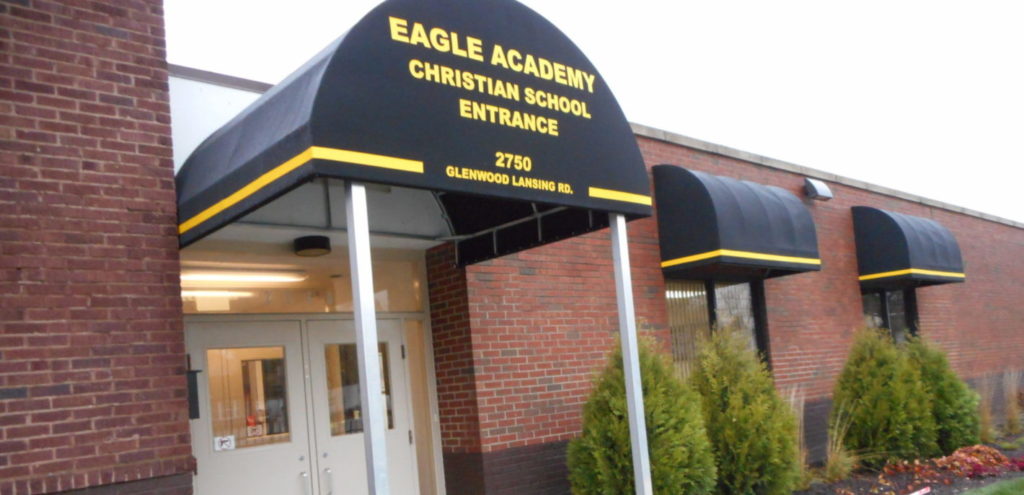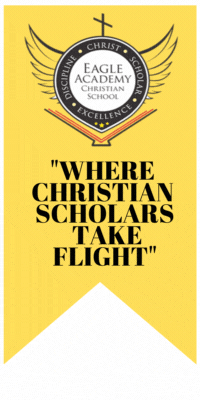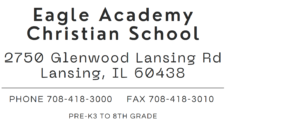About Eagle Academy
Eagle Academy provides a Christian, warm, safe, and caring environment for children. We offer a Christian based curriculum entitled ABEKA as well as Creative Curriculum. Our curriculum begins as early as Pre-Kindergarten. Eagle’s concept is to soars high over any storm or adversities which is the expectation we put in front of our students. Never give up and spread your wings like an eagle.
About Our Staff
Our Principal and teachers are loving, caring, and nurturing individuals. We have teachers educated in various disciplines to meet the content areas. Our younger grades of Pre-K3 and Kindergarten will have teachers with early childhood experience with a degree from an accredited college or university. Every aspect of our day is planned to encourage each student to experience success, to develop a positive self image and to help each one develop the social, emotional, physical, creative and intellectual aspects of their personality.
About Our Curriculum
ABEKA is the curriculum of choice that is used for our students beginning at Pre-K to eighth grade. This curriculum offers math, writing, phonics, literature, science, God’s word and more…. The curriculum guides the teacher’s role in addressing content in literacy, math, science, social studies, the arts, and technology. The curriculum is based on theories and research to serve each student individually including those who have special needs or are English language learners.
Educational Philosophy
“Education is the most powerful weapon which you can use to change the world.” – Nelson Mandela
We promote the concept that all children can learn when they are challenged, supported, respected and motivated. Students will thrive if we create a more personalized school experience for them with small group, individualized instruction that takes place in a small school setting where each student is known by their own individuality. Furthermore, we believe that approaching student learning styles at their educational level while teaching them to set goals, work hard, meet challenges, and help others will lead them to success in school and in life. Over the past few months, we have visited three schools and met with city and state officials. An abundant level of support has been provided as we launch this endeavor.
Eagle Academy Christian School will ensure that students have a strong, solid knowledge acquisition to be successful in college. Students will learn to effectively read, write, listen, think logically, and problem solve within a curriculum that emphasizes academic rigor while maintaining positive peer and adult interaction. Additionally, an innovative practice we will use is the system of looping which is the practice of placing the same group of students with one teacher for two years which essentially adds time, builds and fosters relationships and will therefore increase student performance. The two year cycles will give teachers more time to develop strong relationships with students and families and to understand and meet their students’ educational needs. In turn we project this system to increase student performance. Additionally, using a “No Excuse” model to raise student expectation level will warrant overwhelming outcomes.
The school will also create a sense of community within the neighborhood that will build new ties and strengthen existing ones in the Southeast Lansing communities. Eagle Academy Christian School will become part of the fiber of the local neighborhood.
To foster learning, bridge the gap and build a strong foundation for college and community leadership, Eagle Academy Christian School will provide the building blocks via a rigorous curriculum based on the Common Core State Standards (CCSS) and include: (1) Immense expectations for academic and social success, (2) Safe, secure, supportive environment in a small school setting, (3) Progressive parent involvement and outreach, (4) Small group differentiated instruction combined with direct instruction (5) Experiential learning, (6) Data driven instruction, (7) More instructional learning time, and (8) Intensive tutoring.





